- Home
- Gregory Ashe
The Keeper of Bees ARC Page 2
The Keeper of Bees ARC Read online
Page 2
“No,” Noah said, wriggling on the cushion so that he looked like he was in danger of falling off. “No way, this is a matter of principle now. This is one of the best action movies ever. Emery, everybody loves this movie.”
“Not everybody,” Hazard said.
“Pretty much everybody. I mean, look, you’ll be in really good company. Lots of smart people like Die Hard. Lots of really smart filmmakers and screenwriters and directors. Those are the kind of people who like this movie.”
Dropping into an armchair, Somers kicked up his legs and said to no one in particular, “That was probably not the tack I would have chosen, but I’m interested to see how this plays out.”
“Don’t be smart,” Hazard said to him. Then, to Noah, “Judging by the commercial,” he pointed to the screen, “and the way TV marketing groups target advertisements to audiences based on statistically likely demographics, it would also put me in the same group as people who need yogurt to complete a bowel movement.”
Noah’s jaw dropped.
“More or less what I expected,” Somers said, “although the poop angle was a nice twist. I was anticipating something along the lines of ‘moral and intellectual degeneracy.’”
“I told you not to be smart.”
Somers beamed up at him.
“Emery,” Noah said like a man who’d received a blow to the head. He turned to Somers and said, “I can’t. I just can’t.”
“Ree,” Somers said, “it really is a pretty good movie. Will you stay and watch it with us?”
“No.”
“You can appreciate it as a historical artifact.”
“No. It has cheesy dialogue. ‘Yippee ki-yay.’ I mean, come on, John.”
“You can acknowledge it as a cultural marker, a shift in a film genre’s trajectory.”
“No. The lone-hero trope is ridiculous bullshit, John. People need to recognize and value cooperative heroism, the teams of people like police who work together to keep us safe.” Hazard tried to stop there, but words spilled out of him. “And besides, it has an unnecessarily complicated plot. The bad guys have to pretend to be terrorists to get the power cut to get into a bank vault, so they’re really just thieves, but they draw all this unnecessary attention, when they could have completed most of the robbery without drawing any attention and then shut off the power independently. And John McClane makes bad decision after bad decision. I’m not just talking about walking on broken glass. I mean, all he had to do was sneak down to the garage and call for help, but instead, he fights a guy with a gun, barehanded, and somehow he wins. I mean, that’s really teaching people some terrible lessons about combat strategy and survival.”
Somers’s eyes glittered, tropically blue.
“I, uh,” Hazard said. “I mean, that’s what I’ve heard.”
“You watched the whole thing.”
“Don’t be ridiculous.”
“You read the Wikipedia summary.”
“I did no such thing.”
Somers leaned back in the armchair; the house settled with a creak, and kids’ laughter came from downstairs.
“I might have read a few synopses,” Hazard said. “It was a long time ago. It’s hard to remember.”
“This is a travesty,” Noah said.
Hazard squared his shoulders, chin up. “I should probably get Evie home. It’s almost her bedtime.”
“Dang it,” Somers said, checking the clock. He rolled out of the chair, clapped Noah on the shoulder, and said, “Another time.”
“Are you sure?”
“Thanks for having us over.”
“You can stay, John,” Hazard said.
But Somers just smiled and helped him collect Evie, and then a swarm of children was trying to hug Evie and hug Somers and hug Hazard. Hazard decided the best policy was to do what you were supposed to do with most wild animals: stay still and wait for them to go away. The barrage of hugs finally ended, and Somers had a crazy-ass grin as he led Hazard out of the house.
“What?” Hazard said.
“I just love you sometimes.”
“Sometimes?” Hazard grumbled.
They got Evie through her bath and into bed, and then Hazard read in bed while Somers played on his phone.
“You could have stayed, John. If you wanted to watch the movie, I could have gotten Evie to bed.”
“I know,” Somers said. And then he tossed the phone on the bed and rolled, straddling Hazard. He looked down. He carefully closed the book and lifted it from Hazard’s hands.
“I was reading that.”
“I noticed.”
“If you want to watch those movies, I don’t care. I want you to watch what you want to watch.”
“I’ve seen it before,” Somers said, shucking his shirt, exposing the hard lines of muscle and ink. “Besides, I think I liked your version better.”
“Yeah?” Hazard said.
Somers took his hands and moved them up to his chest, leaning into the touch. “Yeah,” Somers whispered.
CHAPTER TWO
JULY 1
MONDAY
8:07 AM
SOMERS WAS AT HIS DESK, clicking through emails that had arrived overnight. The bullpen inside the Wahredua Police Department was busy; uniformed officers had just completed the morning briefing, and now they milled around, talking and drinking bad coffee and putting off patrol for a few minutes. The city’s four detectives were all at their desks: Carmichael and Moraes worked all the drug-related cases in the city—despite their best efforts, central Missouri still produced and distributed a great deal of meth—and Somers and Dulac worked everything else.
At the moment, thankfully, everything else made a pretty small pile: Somers was currently examining expert testimony in a case of destroyed mailboxes. The self-appointed expert, Mrs. Bruce Campbell, had been Somers’s 7th-grade science teacher, and she insisted that the mailboxes had been destroyed with what she continuously referred to as an IED. For the sake of John-Henry Somerset, who had taken a B- in 7th-grade science (she included the grade when she reminded him of how they knew each other), she explained the acronym at the beginning of the email: improvised explosive device.
Somers didn’t doubt her opinion, but his annoyance at her tone had made the case a frequent topic of conversation with Hazard over dinner. He made a note to arrange an interview. As he moved on to the next email, though, Chief Cravens opened the door to her office and called his name. When Somers looked up, she beckoned.
Dulac silently held out his fist, and Somers bumped knuckles with him as he made his way out of the bullpen. He let himself into the office and found Cravens behind her desk; an older man with a crew cut and police blues stood to one side. On the desk, a cardboard box was folded shut, and the pictures of Cravens’s nieces and nephews were gone.
“Go ahead, John-Henry,” Cravens said, gesturing to a chair. “This isn’t exactly an official conversation.”
Somers took in the cardboard box again; when his eyes moved to Cravens’s face, he saw the exhaustion there, the deep lines that had formed over the last year, the dark smudges under her eyes.
“Should I say congratulations or I’m sorry?” he asked quietly.
“Ask me in six months,” Cravens said.
Somers thought about his father, who had recently won the mayoral election, and about the chief of police, who served at the mayor’s discretion. “If my father—”
“No,” Cravens said, and she smiled and waved a hand. “I’m past all that.”
Outside, the fax machine screeched on and on, the note rising higher and higher until it cut off with a short series of sputters. It reminded Somers of a 1980s TV robot screaming, Malfunction, malfunction. The noise seemed to serve as some sort of signal, because the uniformed officers began to drift toward the exits, heading out for another day’s work. In a matter of minutes, the station had emptied to its usual daytime levels.
“This is Chief Riggle,�
�� Cravens said. “And since I feel quite a bit freer than I have in a long time, I’m going to add that I didn’t request this meeting. He did.” She looked from Riggle to Somers, and then she nodded and picked up the box. “All right, then. Best of luck, John-Henry.”
“Chief—” Somers rose, holding out a hand. “Everybody’s going to want to say goodbye. Leaving like this, not even introducing—”
“I did introduce him, John-Henry. To you. Only a moment ago, in fact.” Cravens took a breath. “A lot of things aren’t in my control anymore; this is. I’m leaving this way because I want to. It’s easier, I guess.”
And then she left, and she was out the door before Somers could think of anything to say.
Riggle moved with a rigidity that made Somers think of kids playing with toy soldiers. He sat in the seat, back straight, chest out, and studied Somers. Somers studied him right back. Thin, with the skin of his face so tight he almost looked ill, Riggle might have passed on first glance for the kind of guy you’d choose to be chief. He had the iron-gray hair, the hard eyes, the air of authority. But a spot of stubble under his chin, the same color as his hair, pulled at Somers’s eyes; electric razor, Somers thought. A quick shave, but not a good one.
“Detective Somerset, I’ll get the pleasantries out of the way. I’m coming here out of St. Joseph; I was assistant chief for five years, and before that, I was a patrol sergeant for ten years. I expect one thing from the men and women under my command: loyalty. Is that clear?”
“Yes, sir.”
“Your father brought me in to clean house. This department has been a snake pit, and Cravens ran a dirty shop. The city deserves better. We’re going to turn the force upside down, give it a shake, and see what kind of shit falls out. Is that clear?”
“Yes, sir.”
“I asked Cravens to have you speak with me because I understand you hold a great deal of influence in this department.”
“That’s high praise, sir. I don’t know if it’s true.”
“You close cases, hard ones. You’ve got a commendation from the FBI. You’ve got history with these people; you came up through patrol here, is that right?”
“Yes, sir.”
“Well, don’t bullshit me, then. You’ve got juice with the men and women here. I expect you to use it on my behalf.”
Somers raised an eyebrow. “Sir?”
“People are going to grumble. Nobody likes change, and I run a tight operation. They’ll have plenty to say about that, I’m sure, and you’re going to be right there when they do it. I want to know who’s talking. I want to know what they’re saying. And I want you to be a little birdie on their shoulders, smoothing things out.”
“So, I’m your . . . public relations guy?” Somers thought the words sounded a tad like Emery Hazard, and he barely remembered to add, “Sir?”
“Your father is the mayor. I’m his choice for chief. Anything that happens to me, that reflects on the mayor. Am I making myself clear?”
Somers had to bite the inside of his cheek for a moment. He tasted blood when he smiled and said, “Clear, sir.”
“Good; your father told me you’d be an asset. I’m going to be hiring several new officers this week, today if possible; I understand the force has taken some blows over the last year. It’s time to start turning things around. You can send the first candidate in when he gets here.” He swiveled in his chair toward the monitor and said, “Dismissed, Somerset.”
Somers let himself out of the office. He made his way back to his desk in the bullpen; Moraes and Carmichael had cleared out, and Dulac was busily flipping through documents, which Somers recognized as paperwork from a case they’d closed a month before. Dulac didn’t look up from pretending to focus on the document, but he whispered, “Dude, what happened? The chief came out with a box, and I swear to God she was about to cry. Where’s she going? Who’s that senior stud in there?”
“Gross,” Somers said.
“He’s got a nice ass.”
Then Somers told him what had happened.
When Somers had finished, Dulac had stopped pretending to be busy with the paperwork, and he watched Somers with his head cocked. Then he said, “Bro, was he wearing a ring?”
“What?”
Dulac tapped his third finger. “Married, dude.”
“He’s our chief.”
“He can be our chief and still be a silver-fox hottie. That’s, like, empowering, you know.”
“You have a boyfriend.”
“Uh, yeah. But I still have eyes.”
“And he’s straight.”
“Really?” Dulac said. “He said that?”
“No, but—”
“Then there’s still a chance, bro.”
Somers just shook his head. From the front of the building came a surge of loud voices, moving deeper into the building. Orear, the officer at the front desk, was shouting something, but it didn’t seem to make any difference. A moment later, a group of men came into view, at least ten of them, all white, all of them under twenty-five, all of them looking like they hit the gym regularly, and all of them with the unmistakable air of assholes. A few of them carried papers in their hands, and Somers groaned.
“What’s with the douche brigade?” Dulac asked.
“Hey everybody,” one of the guys shouted, a short guy with a high-and-tight cut of carrot-colored hair. “Settle your asses down. We’ll take things from here.”
Orear, puffing, came after the men.
“I think,” Somers said, “those are the new recruits.”
CHAPTER THREE
JULY 1
MONDAY
9:02 AM
HAZARD HAD A SLOW START to his morning. He kept an office for his private investigation agency, Astraea, in a set of second-story rooms on Market Street, and he started the day by making sure everything was in order, the way he always did: he straightened the secondhand furniture, brewed a pot of coffee, adjusted the painting that, by the end of the day, would somehow be crooked again, and watered the fern. The cracked front window let in a hot, humid draft, and the fern was thriving. Then Hazard moved into his private office, sat behind the beautiful desk that Somers had stolen, literally, from his father, and got to work.
Astraea was doing better than Hazard could have hoped. In fact, it was doing better than was reasonable. For an agency with only a single employee, operating out of a small town in the middle of Missouri, Astraea was doing astronomically well; Hazard allowed himself a little smile at the pun. He was getting work from Columbia, Jeff City, some of the resort towns scattered around Lake of the Ozarks, even once from Rolla. Most of it was simple stuff, background checks, adultery, nothing particularly challenging. But it was work. And it was work Hazard was good at. And he was proud of what he’d built.
Still, though. There was that itch, wasn’t there? The thought that, not so long ago, he’d done things that felt much more important.
He was typing up a summary of a recent investigation—a man skipping alimony payments, whom Hazard had trailed to an Oklahoma casino—when he heard the outer door open, and footsteps moving through the office. He glanced up.
Mitchell Martin was a wreck today; Hazard barely recognized him as the same kid who’d been flirting, albeit badly, with Nico at the party last night. His fiery hair was flattened and greasy; his watery eyes were sunken and slightly bruised from lack of sleep. He walked with his arms folded, hands tucked into his armpits, and halfway across the room he stopped the way wild animals will sometimes freeze at an unusual sound. He shot a look over his shoulder, and then he hurried into Hazard’s private office.
Hazard saved his report and closed the laptop screen. “Are you wearing makeup?”
Mitchell started to cry.
“Ok,” Hazard said. “What’s going on?”
Mitchell cried harder.
Hazard grabbed a pen and used the tip of it to nudge a box of tissues across the desk.
&nb
sp; Dropping his head into his hands, Mitchell dissolved into sobs.
“If you, uh,” Hazard gave the box another nudge, “want, you know, a tissue.”
“I—I—I—” More sobs. “I’m ok,” Mitchell finally managed in a wail.
Sighing, Hazard stood and came around the desk. He put his hand on Mitchell’s shoulder. He wouldn’t have done this for a normal client; he wouldn’t have done it for a lot of people, in fact. But he owed Mitchell. Mitchell Martin had been his first paying client, and because of that, a psychopath calling himself the Keeper of Bees, who was obsessed with Hazard, had abducted Mitchell, tortured him, and left him to die. It was only luck that Hazard had found him in time.
“I’m ok,” Mitchell said through thick sobs. “I’m ok.”
“Do you want some coffee?”
Mitchell’s thin shoulders shook; he was still just a kid, really. Nineteen, almost twenty. A kid who had been so smart he’d gotten bored in school, graduated early, and gone to college at fourteen.
“How about water?”
More sobbing.
Hazard stepped out of the inner office, hurried into the bathroom with its ancient porcelain fixtures, and filled a paper cup at the tap. He went back to his office and found Mitchell behind the desk, going through drawers.
“Where—” Mitchell was trying to say through his tears, pawing at papers and staplers and bottles of Wite-Out. “Where—where—” He kept trying to talk through the tears, but the only word Hazard could make out was where. And then he caught one other word: gun.
“No,” Hazard said, setting down the water. He took Mitchell by the shoulders and walked him back around the desk. “No guns. Sit down. Here’s what I tell Evie when she gets worked up like this: you take one big breath, and then you take one tiny sip of water. Ready?”
Mitchell was trying to say something through his sobs.
“Great,” Hazard said. “One big breath. Right now, Mitchell.”
To his credit, Mitchell tried.
“Now, water.”
Mitchell sipped and sputtered and coughed.
“Big breath,” Hazard said, slapping Mitchell on the back. “And now, water.”

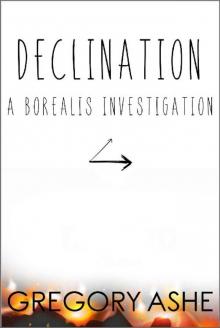 Declination
Declination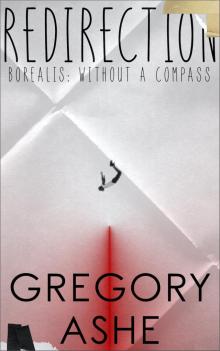 Redirection
Redirection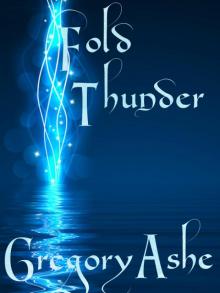 Fold Thunder
Fold Thunder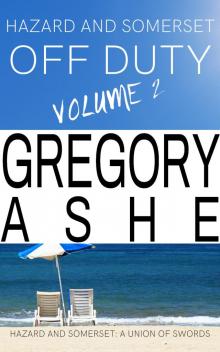 Hazard and Somerset
Hazard and Somerset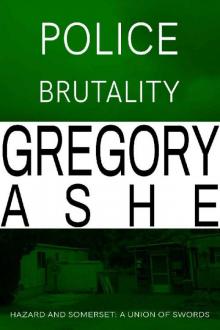 Police Brutality (Hazard and Somerset: A Union of Swords Book 2)
Police Brutality (Hazard and Somerset: A Union of Swords Book 2) Wayward
Wayward The Same End (The Lamb and the Lion Book 3)
The Same End (The Lamb and the Lion Book 3)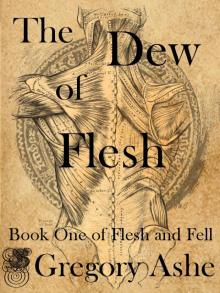 The Dew of Flesh
The Dew of Flesh The Same End
The Same End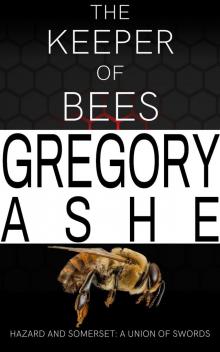 The Keeper of Bees ARC
The Keeper of Bees ARC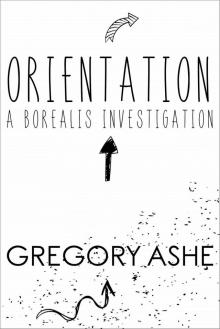 Orientation (Borealis Investigations Book 1)
Orientation (Borealis Investigations Book 1) The Indifferent Children of the Earth
The Indifferent Children of the Earth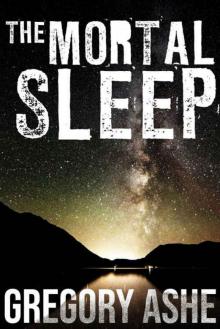 The Mortal Sleep (Hollow Folk Book 4)
The Mortal Sleep (Hollow Folk Book 4)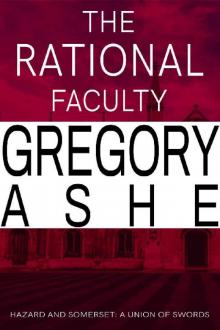 The Rational Faculty (Hazard and Somerset: A Union of Swords Book 1)
The Rational Faculty (Hazard and Somerset: A Union of Swords Book 1) The Weeping Lore (Witte & Co. Investigations Book 1)
The Weeping Lore (Witte & Co. Investigations Book 1)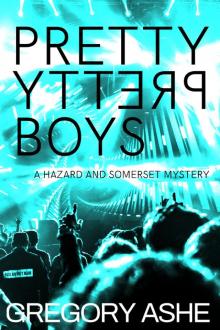 Pretty Pretty Boys
Pretty Pretty Boys Transposition
Transposition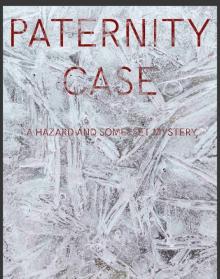 Paternity Case
Paternity Case